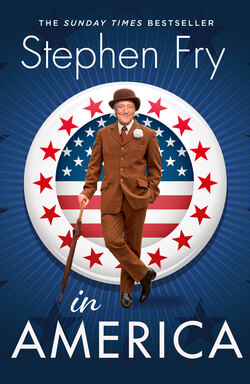Читать книгу Stephen Fry in America - Stephen Fry - Страница 23
The Pilgrims
ОглавлениеI drive along the coast to Plymouth, Massachusetts where they keep a replica of the Mayflower, the ship that carried a boatload of Puritans from Plymouth, Devon to the coast of America in 1620–21. These Pilgrim Fathers have been given, almost arbitrarily one might think, the iconic status of nation-builders; it is almost as if Plymouth Rock is the very rock on which America itself was built. The turkeys those pilgrims killed for food and the sour cranberries they ate with them in their first hard winter are annually memorialised on the third Thursday of every November in the great American feasting ritual known as Thanksgiving. Those who can trace their ancestry back to the pilgrims count themselves almost a kind of aristocracy.
I enjoy a morning clambering about the boat listening to the heritage talk and watching parties of American schoolchildren having the legend of the Pilgrim Fathers reinforced in their young minds.
‘I be John Harcourt, out of Plymouth, Hampshire,’ declaims a bearded man in a leather jerkin.
‘No you baint,’ I tell him firmly. ‘You be an actor, out of New York City.’
Only I say no such thing because I am too polite. The ship is crewed by Equity members in smocks and leather caps whose idea of an English accent is to say ‘thee’, ‘thou’ and ‘my lady’ and trust to luck.
‘Do thee hail from the Old Country?’ I am asked.
‘No, no, no!’ I am once more too polite to say. ‘You mean “Dost thou” – “Do thee” makes no sense.’
The idea that the Puritans came to New England to avoid persecution is lodged firmly in the American psyche. Gore Vidal’s view that they came, ‘not to be free from persecution, but on the contrary, to be free to persecute’ while heretical to America’s vision of itself is to some extent born out in the literature of Hawthorne and the decidedly murky regimes of tyranny, bigotry and intolerance under which the citizens of the New World were forced to live in the early days. Quakers, for example, were persecuted, suppressed, tortured and discriminated against in much of New England throughout the early years of the colonies. But I suppose the tortuous alteration of real history and the elevation of the Pilgrim Fathers to heroic status was important for America, which needed to create a vision of itself consonant with its lofty aims. I dare say Robin Hood was a greedy cut-throat and Boadicea a cruel tyrant – all nations twist history and cleanse their heroes in order to express an ideal to live up to.
Nowhere in America is the religious intolerance and fanaticism of the early colonies more apparent, or more weirdly celebrated, than in the small town of Salem, MA.
